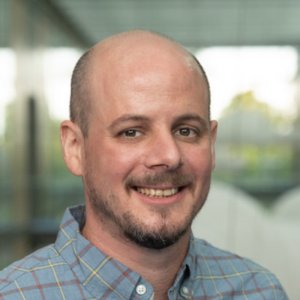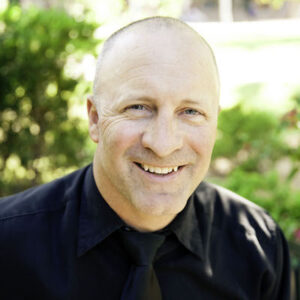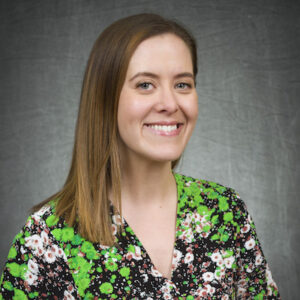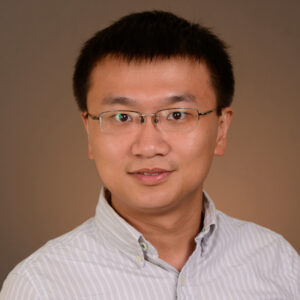“To read is to fly; it is to soar to a point of vantage, which gives a view over wide terrains of history, human variety, ideas, shared experience and the fruits of many inquiries.” — A.C. Grayling
In this 12th edition of the annual Essential Reading feature, faculty and staff members in the Ira A. Fulton Schools of Engineering at Arizona State University recommend books to students on topics that span across an array of pursuits, perspectives, inquiries and intriguing narratives.
Along with this year’s selections, there are links to previous editions of Essential Reading, offering more books that can provide readers everything from signposts pointing the way to wisdom or simply some educational entertainment and imaginative viewpoints on life.
“The Three-Body Problem” by Cixin Liu

Christian Arenz
Recommended by Christian Arenz, assistant professor in the School of Electrical, Computer and Energy Engineering
"The Three-Body Problem" is a series of three science fiction books that peer into the future of the human race, primarily the technological advances and societal challenges of that time. Each book describes a different time period in the future. The narrative is driven by the threat of an alien civilization that plans to invade Earth. I consider this series a masterpiece of the science fiction genre because it touches on every aspect of human life, society and technology. When I read the series for the first time, it was hard to put the book away. I was constantly thinking of how certain concepts in the book touch on my own research in quantum computing. Even for those who are not necessarily fans of science fiction, this book could still be particularly enlightening.
“An Engineer Imagines” by Pete Rice

Elham Fini
Recommended by Elham Fini, associate professor in the School of Sustainable Engineering and the Built Environment, and Thomas Hartman, associate professor in The Design School, part of the Herberger Institute for Design and the Arts
Rice’s autobiography describes the life and work of an engineer who did not limit himself to problem-solving. He also used mathematics, engineering principles and his imagination to become an essential collaborator in the design of buildings embodying the best of both engineering and architecture. Rice shows how an engineer can also think and act as an architect, artist, poet and storyteller all at the same time. He describes how science enables an engineer to combine imagination and inspiration to create truly meaningful solutions.

Thomas Hartman
Rice also describes how the convergence of science, engineering and art can lead to lasting masterpieces that speak powerfully to a building’s visitors and occupants. This is explained in the book by descriptions of the author’s collaborations on the construction and design of such renowned edifices as the Sydney Opera House, Pompidou Centre, the Lloyd’s building and others.
"Thinking, Fast and Slow" by Daniel Kahneman
Recommended by Mehdi Nikkhah, associate professor in the School of Biological and Health Systems Engineering
Kahneman takes a deep look at our modes of thinking. He examines the logical, emotional, instinctive and judgmental aspects of our mentalities and how they shape the ways we think about almost everything. He explores two cognitive systems. System 1 is fast, intuitive, automatic and mainly relies on our biases, while System 2 is slow, analytical, logical and based on mental concentration and effort. He examines the interplay of mental and cognitive processes and explains how they determine the fundamental psychological framework of our thinking. He further explains how these systems and their interactions affect our decision-making process and judgment in various contexts such as psychology, economics and neuroscience.

Mehdi Nikkhah
The author looks at how our patterns of thought are the foundations from which we develop perspectives, form opinions and contextualize what we learn and experience into a personal worldview. Kahneman details how certain characteristics of our thought processes can not only determine our attitudes and biases, but also set the stage for fostering positive and productive mindsets. Most importantly, the author offers guidance on how to adapt our thinking processes to help us make good judgments and decisions.
"Life Is in the Transitions: Mastering Change at Any Age" by Bruce Feiler
Recommended by Kurt Paterson, professor and director of The Polytechnic School
What will you be doing after graduation? It’s likely that some of you have asked yourselves that question — in terms of both your career goals and the kind of life you want to live. But what must happen for those ambitions to be realized? And what will you do if your plans and goals don’t come to fruition? With curricular maps as a navigational aid in college, it’s easy to believe that life will be similarly linear, planned and predictable. But Feiler’s book posits that one of the most important skills you can cultivate is your ability to respond to disruption.

Kurt Paterson
In fact, Feiler writes, your life will be determined largely by the accumulation of your responses to these many decision-making turning points that lie ahead. The author offers simple strategies to try one transition at a time, and for motivation, Feiler provides numerous enlightening short stories about real people striving to build meaningful lives.
"Sapiens: A Brief History of Humankind" by Yuval Noah Harari
Recommended by Giulia Pedrielli, associate professor in the School of Computing and Augmented Intelligence
Harari gives us a brief overview of human history, which in and of itself is important for us to understand because our evolution has been nothing short of remarkable. But, just as important, he argues that humanity’s progress has essentially come from our ability to tell and believe stories, regardless of their truth. These stories are what rally us around ideological concepts like religion, nationalism and what progress really means.

Giulia Pedrielli
In our roles as scientists and engineers, this helps us put things in perspective, because no matter how intellectually advanced we become, we are still susceptible to the stories we hear and tell ourselves. The book can also be valuable to students as a useful reminder: What you choose to believe shapes your outcomes. So, believe in yourself and your ability to achieve something great. Appreciate that humility is what takes you further in life than your ego. Ego is what forces you to buy into a story that may no longer serve you in a positive way, while humility keeps you adaptable to what serves you best.
"Casca" by Barry Sadler and ghostwriters
Recommended by Michael Sever, assistant director of academic services in the School of Sustainable Engineering and the Built Environment
“Casca” is a series of 53 books about the life of Casca Rufio Longinus, a Roman soldier cursed to live forever as punishment for piercing Jesus Christ with his spear at the crucifixion. The first book, “Casca: The Eternal Mercenary,” introduces Casca as he wanders the world, seeking redemption for his sin. Thrust into historic conflicts, including the American Revolution, World War I, World War II and the Vietnam War, as a mercenary doing the only thing he knows how to do — be a soldier — Casca encounters historic figures such as Genghis Khan, Attila the Hun and Julius Caesar.

Michael Sever
He witnesses the deaths of those he cares for, questioning if eternal life is truly a gift or a curse as he struggles to find meaning in his never-ending existence. With action, compelling characters and a unique viewpoint on immortality, the series is a must-read for fans of historical fiction and adventure by Barry Sadler, a U.S. Army Green Berets staff sergeant and medic who served in Vietnam. The series has been ghost written since Sadler’s death in 1989.
"Psycho-Cybernetics" by Maxwell Maltz
Recommended by Alicia Somsen, academic success advisor in the School of Computing and Augmented Intelligence
Looking to upgrade your mental software? The updated and expanded version of “Psycho-Cybernetics” is the perfect guide for anyone looking to reprogram their brain and unlock its full potential. What’s unique about this book is that the author wasn’t a psychologist. He was a plastic surgeon in the 1950s who wanted to understand why people were unhappy with their appearance and with themselves. His goal was to talk them out of his cosmetic services by helping them rewire their negative thought patterns.

Alicia Somsen
Maltz’s innovative approach combines psychology, cybernetics and good old-fashioned common sense to help readers overcome self-doubt and achieve their goals. With practical advice, real-life examples and a healthy dose of humor, “Psycho-Cybernetics” is a must-read for anyone looking to reboot their mental operating system and live their best life. So, why settle for a sluggish mind when you can upgrade to a faster, smarter and more efficient you? I especially recommend the audiobook version at 1.5 times speed.
“Frankenstein” by Mary Shelley
If Mary Shelley had ChatGPT when she was tasked with writing a ghost story in a friendly, impromptu writing competition, would the themes in “Frankenstein” be any different? The novel is included in Harold Bloom’s “The Western Canon: The Books and School of the Ages” because it withstands the test of time by delving into what it means to be human. The novel elucidates classic conflicts of human versus nature, self and other humans. After suffering the loss of his mother, Victor Frankenstein is passionately motivated to reanimate parts of corpses to prevent the pain of losing a loved one. His passions are not tempered with responsibility, however, and as soon as Victor succeeds in his endeavor, he is horrified at the result and abandons his creation, which leads to disastrous consequences. A read of “Frankenstein” is an opportunity for reflection as we make technological progress with generative artificial intelligence and its potential implications for significant destruction of the human experience. Will we learn from Victor Frankenstein’s unchecked ambition?
"The Five People You Meet in Heaven" by Mitch Albom
Recommended by Melissa Stine, senior coordinator in the Student Success and Engagement Office

Melissa Stine
Albom’s book emphasizes the interconnectivity of human lives and how our actions, whether positive or negative, can have an impact on those around us. It tells the story of Eddie, a war veteran and maintenance worker at an amusement park, who dies while trying to save a young girl falling from one of the park’s rides. In the afterlife, Eddie meets five people who had a profound impact on him during his life. Through these encounters, Eddie learns important lessons about the interconnectedness of people and the meaning of his own life. In addition to connectedness, the notion of forgiveness and redemption are key themes in the story. My mother first recommended the book soon after its release in the early 2000s. I read it in one sitting. This book will leave you feeling better than before you started reading it — and make you want to call or see someone you haven’t spoken to in a while.
"Educated: A Memoir" by Tara Westover
Recommended by Wenlong Zhang, associate professor in the School of Manufacturing Systems and Networks

Wenlong Zhang
This award-winning memoir details Tara Westover’s journey from early childhood to earning a doctoral degree at Cambridge University. Raised on the outskirts of a small town in Idaho and homeschooled until the age of 17, Westover overcame many obstacles to reconcile her desire for education and autonomy with her family’s rigid ideology and isolated life. Her book can teach us to overcome limits put on us by others. Our beliefs and attitudes reflect the environments in which we grew up, and it is often difficult and painful to overcome the pull of such influences. Westover had such an experience and overcame the limits put on her by pursuing education. Her story reflects what I think is the real value of education. It is not about building a machine or programming software or getting an impressive job title. It is about the friends you make, the networks you build and the perspectives from which you learn to view and solve real-world challenges. No matter what your major is, I recommend reading this book and thinking about what being “educated” means to you.
Check out book recommendations from Essential Reading features of past years:
More Science and technology

Smarter tools for peering into the microscopic world
The microscopic organisms that fill our bodies, soils, oceans and atmosphere play essential roles in human health and the planet’s ecosystems. Yet even with modern DNA sequencing, figuring out what…

Securing America's critical minerals supply
You may never have heard of gadolinium, praseodymium or dysprosium, but you use them every day in your smartphone’s display. They are a few of the 60 elements and minerals known as “critical minerals…

James Webb Space Telescope opens new window into hidden world of dark matter
NASA’s James Webb Space Telescope (JWST) has revealed unparalleled details about the early universe: observations of young galaxies with unexpectedly elongated shapes that challenge established…
